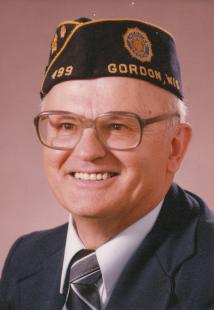Merton Charles Warner
Era: World War II
Military Branch: Army

Merton Charles Warner served in World War II in the European Theater specifically, in France, Germany, and Austria.
Mr. Warner served in the U.S. Army beginning on May 4th, 1943. He was assigned to Company C, 371st Medical Battalion, the 66th Infantry Regiment and the 71st Infantry Regiment.
He was honorably discharged from the Army on April 23, 1946. Mr. Warner’s rank was Technical Sergeant Third Grade (T/3).
He was decorated with the: Bronze Star Medal (1), Good Conduct Medal, American Campaign Medal, European-African-Middle Eastern Campaign Medal (2 stars), WWII Victory Medal, Army of Occupation Medal, and Combat Medical Badge.
Merton Warner was born in Black Brook Township, Clear Lake, Wisconsin in January of 1924. He is the son of Charles and Gertrude Warner. He graduated from Drummond High School in 1943 and then vocational school in 1948.
Source: Veterans’ Memorial Hall veteran history form; veteran’s account follows:
“Before We Are Gone” - Memories of World War II
"When World War II broke out, after having gone through the Depression, we were not accustomed to a lot of luxury, and appreciated sharing what we had.
My dad had served in WWI, where he was wounded and gassed, so I’m sure it was hard to see his twins leave for the war. We entered the service 3 ½ weeks before graduation. On the third day, we were separated. Being small, none of my Army-issued clothing fit. I took them back to the commissary to be exchanged or cut down, but not having the proper attire and mixed uniform I was put on detail washing our barracks windows! However, I looked out and saw my brother, Berton, marching by with all his gear. I found a note on his bed that read, “I’m leaving but I don’t know where.” I felt far away from my home, from Berton, and very alone.
Berton went directly to North Africa, and then to Italy without coming home on furlough. I didn’t see Berton until over three years later when I returned from service. Berton was already married by that time. Years later he lost his only son, Dan, a Marine, in Viet Nam.
Prior to entering the Army on May 4, 1943, I recall having a sticker on my Model A which read, “IS THIS TRIP REALLY NECESSARY?” We had ration stamps for gas, sugar, meat, and other things. I still have a sugar ration stamp. People from all walks of life banded together, worked in the shipyards or wherever either man or woman could help in the war effort.
I went to Camp Grant, Illinois, Camp Barkeley, Texas, and Camp Carson, Colorado, and to Hunter Liggitt Military Reservation in California, where we maneuvered with mules and on to Fort Benning, Georgia. From there I attended the University of New Hampshire at Durham for engineering school for a short time, and then transferred to O’Reilly General Hospital at Springfield, Missouri, for Medical Technician duty.
I was sent overseas to LaHavre. It took twelve days to cross the Atlantic Ocean, on a small Liberty ship holding nine hundred passengers. We were part of a convoy of one hundred ships, including destroyers and support ships. We traveled in a zig-zag pattern to avoid detection by enemy submarines. At one point we were told to put on our lifejackets as a sub had been sighted. Depth charges were deployed that shook our ship.
Our outfit moved through France, Germany, and Austria. Each training camp in France was named for a cigarette. Ours was “Camp Gold.” It was there that we prepared to go through the Siegfried Line. An interesting thing happened as we traveled in France; out walked a face from my past, Roland Benson, who had attended Drummond High School with me! His outfit had held the Germans at that location before we relieved them. We were unable to do more than simply wave at each other as we passed. From that moment we pushed on more than 1,200 miles and 59 days of combat to reach Steyr, Austria, where we met the Russians. Our division was the furthest unit east in Europe.
It was there that, at the close of the war, I set up an aid station, only to find out it was a maternity ward! The Hungarian doctor thought I was an American doctor, so I assisted in delivering a baby girl and prepared the drops for the baby’s eyes.
At one point, we liberated a concentration camp. There were estimated to be four thousand living and four thousand dead in the camp, all Hungarian Jews. During the 2½ weeks that I was there, I personally treated over sixty people a day with plasma. Later I was transferred to an all American-born Japanese team . . . all except me, that is! We went to a displaced persons’ camp and gave shots all day.
In summary, war is a terrible thing, but when we look back, we were able to make some lifelong friends, and knew that we had served our great country. And when we sighted the Statue of Liberty, how thankful we were to be coming home! The Lord has been good to me, and I give thanks."
Additional note: Japanese internment – for secrecy May 8, 1945 – end of European Theater of Operations conflict September 2, 1945 – end of Japanese conflict Our outfit was scheduled to go to Japan, but the atomic bomb changed that.

